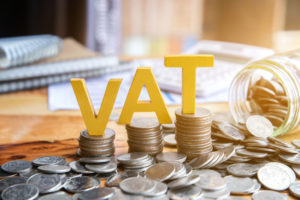
The results of the summit held by the National People’s Congress and the Chinese People’s Political Consultative Conference has been a hot topic over the past month. They represent two of the most influential assemblies in the world, held each year at the beginning of March.
At this meeting, known as the Two Sessions, China’s 2019 economic and political course was presented. Among the major announcements was the reduction in the current VAT rates of 16% and 10% to 13% and 9% respectively, according to a government report by Chinese Prime Minister Li Keqiang.
During the year, the VAT rate will be reduced as follows: from 16% to 13% for manufacturing; from 10% to 9% for transport and construction; unchanged at the 6% for the service industry, but there will be other tax benefits coming for the service sector.
Allowing for the aforementioned cut, the total VAT rate will have dropped by almost 25% over the last 12 months by May 1, 2019. Specifically, it fell from 17% to 16% from May 1, 2018, and this time from 16% to 13%. To compare, the average figure in the OECD member countries is 19%.
Meanwhile, there are more changes coming to Chinese VAT rates. The expectation for 2019 and 2020 is that the number of VAT rate levels will be reduced from three (6%, 9% and 13%) to just two. The specifics of this change are not yet public.
In addition, manufacturers and service providers will soon be able to enjoy easier access to loans, and other benefits that will improve their bottom line.
 Why has the Chinese government decided to focus on a reduction of VAT rates? The answer is very simple – they seek to tackle a slowdown in growth which has reached a level not seen for the last 28 years. Last year, GDP growth was at 6.6%, but some analysts say the actual number may be even lower. At the same time, FDI rose by just 3% versus 7.9% in the previous year. This slowdown is due to the trade stand-off with the USA. In 2019, Beijing hopes to see GDP grow by 6.0% to 6.5%, but this projection seems too upbeat to many.
Why has the Chinese government decided to focus on a reduction of VAT rates? The answer is very simple – they seek to tackle a slowdown in growth which has reached a level not seen for the last 28 years. Last year, GDP growth was at 6.6%, but some analysts say the actual number may be even lower. At the same time, FDI rose by just 3% versus 7.9% in the previous year. This slowdown is due to the trade stand-off with the USA. In 2019, Beijing hopes to see GDP grow by 6.0% to 6.5%, but this projection seems too upbeat to many.
The government also aims to boost economic growth through spending. This includes a higher deficit target of 2.8% of GDP versus 2.6% in 2018. Prime Minister Li Keqiang said that to bolster the economy, China’s fiscal policy will become “more forceful” because the government will cut taxes and fees for companies by almost 2 trillion yuan per year ($298.31 billion).
We can already see the VAT decrease reflected in prices of famous brands such as Apple and Gucci, which cut prices for their goods in China from April 1, 2019.
On Apple’s Chinese website, prices have been reduced by up to 500 yuan ($74.44) for some of the latest iPhone models. Notably, as their sales at the end of last year did not match expectations, some retailers dropped prices for the most recent models of iPhones by up to $120 back in January 2019.

According to media reports, Italian brand Gucci cut prices by 3 percent. A Louis Vuitton representative confirmed that they also revised prices accordingly, being “fully supportive of the Chinese government’s ongoing efforts to narrow the price gap between China and overseas.”
Hermes also reported that, given the reduced VAT in China, their prices will be reduced by 3% from the beginning of April.
BMW and Mercedes-Benz also said their prices for certain models will fall after the tax changes in China take effect.
Analysts believe that current changes in the taxation system will help accelerate economic growth and increase both domestic and foreign demand for goods.
What does all of this mean for us at EDS and our clients? From April 1, 2019, we are conducting negotiations with all our suppliers to revise the prices for current and upcoming projects commensurate with the tax rate changes. These changes will bring considerable relief to our clients and make them more competitive in their respective markets.








